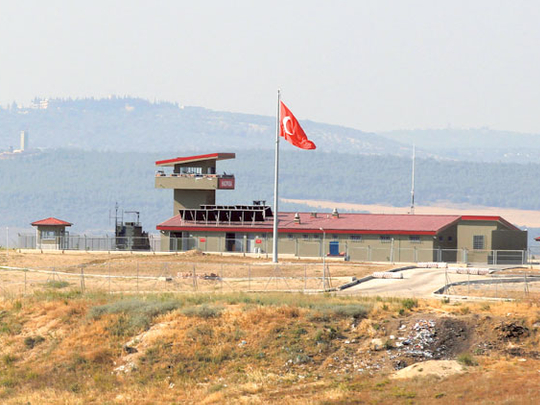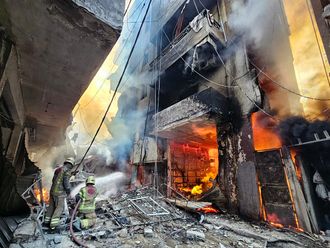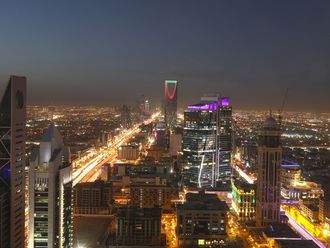
Beirut: Although Syrian–Turkish relations were somewhat strained throughout the 20th century, especially at the height of the Cold War, dramatic improvements were recorded after President Bashar Al Assad visited Ankara in January 2004, becoming the first Syrian leader to do so.
Yet, and in the aftermath of the March 2011 uprisings, relations between the two countries soured once again as previous suspicions resurfaced. Disagreements over Kurdish irredentism, water disputes, and territorial claims all mobilised public opinion in both countries.
Still, with a common land border stretching over 900 kilometres, the determinant factor that affected both countries was geography, the source of epochal clashes that pitted Turks and Arabs for centuries.
In the 20th century, and after the collapse of the Ottoman Empire, Damascus suffered under French occupation. Betrayed by the 1916 Sykes-Picot agreement between France and Britain, Syrian possessions were literally dismembered. A permanent wedge was created with the nascent Republic of Turkey, whose territorial losses were nevertheless partially redeemed when Alexandretta, known as Iskenderun in Turkish, was cavalierly annexed in 1938. The city, part of the Hatay Province, stood as a sore point for Damascus that never accepted this mutilation just as it never accepted the loss of the Bekaa Valley to Lebanon.
Burdened with such a legacy, and after independence in 1946, Syria and Turkey confronted a series of disputes, including the open support extended to the Kurdistan Worker’s Party (PKK). For Ankara as for most Western powers, the PKK was a terrorist organisation, though Damascus perceived it as a liberation movement worthy of assistance. Successive Syrian governments manipulated the Kurdish Question over the years, but President Hafiz Al Assad expelled its most famous guerilla leader in 1998, Abdullah Öcalan, as he reassessed his country’s regional posture. To be sure, Ankara condemned Damascus for supporting Kurdish irredentism, but looked favourably on the critical expulsion that allowed it to track down Öcalan in Kenya a few months later.
Equally important, the two countries were involved in significant water and electricity quarrels, which were heightened after Ankara approved its Southeastern Anatolia Project that encouraged Turkish development throughout Anatolia at the expense of Syrians across the border. The project, which concentrated on the construction of 22 dams and 19 power plants in the basins of the Euphrates and Tigris rivers, diverted significant water resources from Syria. Both Syria and Iraq demanded more water to be released from these dams for their own agricultural needs but Turkey refused. The snub pushed Damascus to encourage PKK activities in the region, whose sabotage work damaged several dams and canals. A number of engineers working at the dams were killed though production continued unabated.
Of course, and notwithstanding the thawing of ties between 2004 and 2011, Arab nationalists neither forgot nor condoned what former colonial rulers did to their country. Importantly, Turkish Prime Minister Recep Tayyib Erdogan saw an opportunity to improve Turkish-Syrian bilateral relations after the 2003 War for Iraq—when Ankara kept its military cooperation with the United States to a minimum—by demonstrating that he could act independently. Al Assad reciprocated and welcomed Erdogan’s 2008 efforts to act as a go-between between Syria and Israel to reactivate the moribund peace talks between the two antagonists. No progress were achieved on that score, especially after Turkish-Israeli ties soured when Erdogan blasted Israeli leaders for launching a merciless attack on the Gaza Strip in late 2008. Tensions rose in May 2010, when Israeli commandos killed nine Turkish passengers and wounded dozens, on ships trying to break the Gaza blockade.
Amazingly, Syria and Turkey held unprecedented three-day-long military manoeuvres in April 2009 to further improve their expanding cooperation, though the 2011 uprising essentially put an end to all such measures. Instead, Ankara sheltered a growing number of Syrian refugees on its territory, with the Turkish prime minister describing Syrian military responses to the daily demonstrations as “savagery.” Although Erdogan previously called on Al Assad to leave office, no such declarations were made in recent months, even if Turkey suspended all of its trade relations and was considering cutting back its electricity feed to Syria. With the deployment of missile batteries along its border with Syria, Turkey was creating a “security corridor,” which could easily escalate into a full-fledged confrontation once international backing was secured. The mid-2000 thaw was, once again, replaced with frosty rhetoric.












